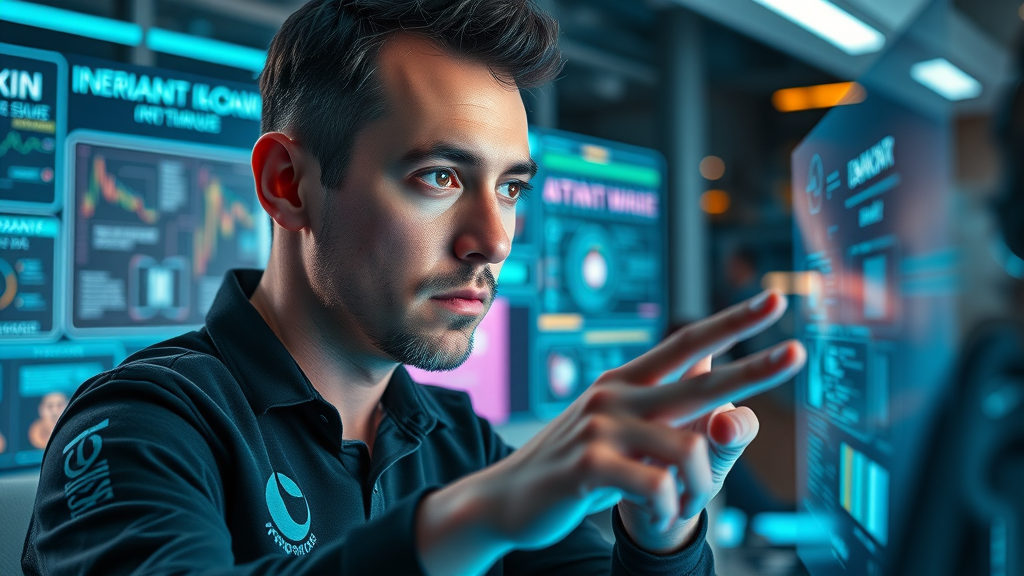The Evolution of AI has been nothing short of revolutionary, with the journey from early expert systems to today's sophisticated large language models capturing the imagination of scientists and technophiles alike. Did you know that the capabilities of some AI systems today rival—if not surpass—the human brain in certain cognitive tasks? This article delves into the rich tapestry of AI's history, examining the major epochs and innovations that have shaped this incredible field.
Unveiling the Evolution of AI: Startling Statistics and Unconventional Facts
The Genesis of Artificial Intelligence
The concept of artificial intelligence dates back to the mid-20th century, with conceptual groundwork laid by thinkers like Alan Turing . Turing proposed questions about the potential for machines to exhibit human intelligence in the 1950s, sparking interest in AI that would eventually lead to the development of fundamental theories and initial systems. The foundational period laid the path for primitive AI systems capable of basic problem-solving and logic.
During these early days, AI research concentrated on developing thinking machines capable of executing tasks that required logical reasoning. This involved exploring the potential of AI to perform operations formerly exclusive to human cognition, like chess playing or theorem proving. The dialogue about what constitutes intelligence was as much philosophical as it was technological, stretching the understanding of the term "intelligence" within machine learning context.
Exploring Expert Systems: The Early Pillars of AI
Expert systems emerged as one of the initial practical applications of AI in the 1970s and 1980s. These systems were designed to mimic the decision-making capability of a human expert, largely focusing on rule-based systems that could process and analyze data effectively. Used extensively in fields like medical diagnosis and financial forecasting, expert systems laid the groundwork for future AI developments. These systems demonstrated that a computer program could emulate the specialist knowledge typically requiring human oversight.
The architecture of expert systems included an 'if-then' rule-based engine, which was a pioneering step, setting the stage for more advanced forms of artificial cognition. By demonstrating that AI systems could be specialized, these early forms of AI solidified the importance and relevance of artificial intelligence across various industries, from agriculture to aerospace.

AI Winter: Navigating Through Challenging Times
The AI community faced what is commonly referred to as the AI Winter , a period marked by reduced funding and interest due to unmet expectations and overhyped promises from earlier AI research. This era lasted from the mid-1970s to the mid-1990s, where skepticism overshadowed breakthroughs, stalling progress temporarily. Financial and practical limitations curtailed growth, leading some experts to conclude that the challenges of developing functional AI systems were greater than initially expected.
Nevertheless, this difficult period forced researchers to refine their approaches, leading to a deeper understanding of computational limits and plausibility. AI winter, although seen as a stagnation period, provided the necessary introspection to redirect efforts into achieving feasible goals, paving the way for future breakthroughs.
The Rise of Neural Networks and Deep Learning
As the industry emerged from the AI winter, the revitalized focus on neural networks and deep learning in the 2010s marked a new era of AI proliferation. Unlike the rule-based approaches of the past, these models emulated the interconnected neuron structure of the human brain , allowing AI to learn and adapt from vast datasets. Deep learning, specifically, expanded the potential of AI by significantly enhancing machine learning capabilities through multiple neural layers.
The practical implications included substantial advancements in areas like language translation and image recognition, where AI systems achieved unprecedented levels of accuracy. These advancements were primarily fueled by the availability of big data , which provided vast amounts of information for training purposes. Ultimately, deep learning models developed at this time have become the backbone for many modern AI systems .

The Impact of Big Data on AI Systems
The role of big data in transforming AI systems cannot be understated. As data generation increased exponentially with the digital age, AI's capability to harness and analyze this data brought about unparalleled advancements in prediction and decision-making. Techniques leveraging big data have enabled AI to facilitate transformative developments across industries, from healthcare diagnostics to autonomous driving.
By interpreting vast swathes of data, AI systems harnessed the potential of machine learning algorithms, continually improving through exposure to new information and feedback. The integration of big data with deep learning highlighted the synergy between the two, leading to the development of applications like natural language processing and enhanced speech recognition systems.

From Deep Blue to Modern AI Systems
Deep Blue: A Milestone in AI's Evolution
The triumph of Deep Blue over world chess champion Garry Kasparov in 1997 marked a significant milestone in AI's evolution . The IBM-developed computer program was a testament to AI's capabilities in handling complex tasks requiring strategic foresight and decision-making. It showcased the potential for AI systems to exceed human expertise in specific controlled environments.
This victory spurred interest in AI, emphasizing both its capabilities and the potential boundaries of human intelligence within certain domains. Deep Blue's success laid a crucial foundation for subsequent AI achievements, leading to the development of more sophisticated generative AI technologies.
The Advent of Generative AI and Language Models
The development of generative AI , particularly language models like GPT-3 and their ability to generate coherent, context-aware text, has transformed human-computer interaction. These models leverage extensive machine learning and deep learning techniques to predict and generate text, offering unparalleled utilities in creative, educational, and commercial applications.
Generative AI has opened new avenues in content creation, customer service, and personalization, establishing itself as an essential tool in modern AI frameworks. By simulating realistic language patterns, these models augment human capabilities, transforming how we access information and communicate within digital realms.

Alan Turing and the Foundations of Modern AI
Alan Turing is hailed as one of the forefathers of modern artificial intelligence. Turing's pioneering work on the concept of a Turing Test , aimed at assessing a machine's ability to exhibit intelligent behavior equivalent to, or indistinguishable from, that of a human, set the groundwork for future developments. His theoretical and practical contributions play an integral role in evolving conceptual understanding and the philosophical debate surrounding AI.
Turing’s influence extends into AI ethics and the ongoing dialogue concerning the responsibilities and implications of developing AI that rivals human thought processes. As AI continues to evolve, Turing’s foundational principles will remain critical to understanding and navigating the moral and ethical landscapes of AI deployment.
The Role of John McCarthy in AI's History
John McCarthy is another notable figure in the history of AI, credited with coining the term artificial intelligence and organizing the Dartmouth Conference in 1956, a seminal event that laid the foundation for AI research as a field. McCarthy's introduction of the LISP programming language became crucial for developing AI research, allowing for more sophisticated experimentation with AI concepts. His vision for AI significantly shaped its early research directions.
McCarthy’s contributions weren't limited to technology. He was instrumental in envisioning AI's potential to transform society and economics. His foresight in AI's capabilities has inspired decades of researchers and practitioners, ensuring a lasting legacy in both theoretical and practical realms of AI system development.
Modern AI Systems and Their Capabilities
Neural Networks in Image Recognition
The application of neural networks in image recognition has led to breakthroughs in how machines interpret and process visual data. Utilizing complex algorithms that mimic the human brain's way of recognizing patterns, AI has become adept at differentiating and categorizing objects within images. This has led to transformative impacts in sectors ranging from security through advanced surveillance systems to healthcare, improving diagnostic procedures through enhanced imaging techniques.
The development of neural models that can discern image elements has streamlined automated sorting, assembly, and quality control in manufacturing. Additionally, image recognition capabilities support AI applications in augmented reality and content personalization, exemplifying AI's versatility in handling varied and complex visual information.

Artificial Intelligence and the Turing Test
The Turing Test remains a benchmark for evaluating the success of artificial intelligence systems in performing tasks indicative of intelligent behavior. Although the test is often discussed in theory, its principles remain relevant as AI continues to evolve. The notion of creating truly autonomous systems capable of passing a Turing Test reflects ongoing goals within AI research to develop machines indistinguishable from human inquiry capabilities.
As AI reaches new heights with language processing and deep learning advancements, the quest to satisfy Turing's requirements underscores the profound potential and challenge of artificial intelligence, pushing researchers to innovate and refine AI's conversational and decision-making technologies.
The Future of AI: Predictions and Possibilities
Looking ahead, the future of AI presents exciting and transformative possibilities. AI's integration across various facets of life—such as personal assistance, cognitive computing, and autonomous vehicles—indicates a trajectory of increasingly advanced and sophisticated applications. AI's capacity to learn independently and adapt autonomously continues to inspire optimism and caution alike, urging society to address ethical considerations and potential implications proactively.
The exploration of AI's future remains replete with optimism for changing everyday experiences and redefining industries. As AI systems continue to mature, their expanding role in augmenting human ability and enhancing autonomous capabilities suggests a profound shift towards a more deeply interconnected digital and intelligent future.

What is the Evolution of AI?
Answer to 'What is the evolution of AI?'
The evolution of AI represents a progression from rudimentary data-processing machines to sophisticated, context-aware systems that mirror complex human intelligence . AI began with basic expert systems , evolved through the era of neural networks and deep learning , and now incorporates advanced generative AI and language models . This evolution underscores AI's transformation into a cornerstone of modern technological advancements, fundamentally altering how machines interpret and interact with their environment.
What are the 4 stages of AI?
Answer to 'What are the 4 stages of AI?'
The four stages of AI development can be categorized as follows: Reactive Machines , possessing no memory or learning capabilities; Limited Memory , capable of learning from historical data; Theory of Mind , which understands emotions and human interaction; and Self-Aware AI , a theoretical stage possessing self-awareness and autonomous thought processes. These stages reflect AI's ongoing journey toward simulating comprehensive human intelligence .
What are the three evolutionary stages of artificial intelligence?
Answer to 'What are the three evolutionary stages of artificial intelligence?'
The three primary evolutionary stages of artificial intelligence are expert systems, which provided rule-based task automation; neural and deep learning , which introduced adaptive learning from vast data sets; and current generative models, which synthesize new content and anticipate human needs. Each stage represents a significant leap in computational capabilities allowing for improved AI system effectiveness and applications.
How close are we to True AI?
Answer to 'How close are we to True AI?'
While existing AI demonstrates remarkable abilities, achieving "True AI"—a fully autonomous and self-thinking machine—is still a pursuit touching on cutting-edge research. Current systems only partially simulate complex human cognition. Nevertheless, continuous advancements in machine learning and ethics discussions push the boundary toward realizing increasingly autonomous AI systems, emphasizing the importance of preparing for potential impacts on society.
Key Takeaways from the Evolution of AI
-
List of major stages in AI development: Reactive Machines, Limited Memory, Theory of Mind, and Self-Aware AI
-
Impact of AI systems in modern technology: Enhancements in healthcare, autonomous vehicles, and data analysis
|
Stage |
Key Developments |
Decades |
|---|---|---|
|
Expert Systems |
Rule-based automation |
1970s-1980s |
|
Neural Networks & Deep Learning |
Data-driven learning models |
1990s-2010s |
|
Generative AI and Language Models |
Content creation and interaction |
2010s-present |
"AI is likely to be either the best or worst thing to happen to humanity." — Stephen Hawking
-
FAQs about the Evolution of AI and Future Prospects
 Add Row
Add Row  Add
Add 




Write A Comment